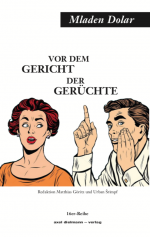Authors & Books
Mladen Dolar
Mladen Dolar, born in 1951, is a philosopher, psychoanalyst, cultural theorist and film critic and, together with Slavoj Žižek and Rastko Močnik, founder of the »Society for Theoretical Psychoanalysis«. For all his philosophical finesse and linguistic alertness, he is on the trail of a subject that is almost impossible to approach: the rumour. By delving into the rumour mills of world literature, he reveals to us a few things about the sinister lust for gossip ...

In Front of Court of Rumours
An Essay
- series 16ers
- hand-stitched
- 40 pages
- cared for by
- Matthias Göritz and Peter Šrimpf
- a volume in our
- BOX—the wild Slovenes
- at Slovenia as Guest of Honour 2023
978-3-86638-401-9

However unfounded they may be, rumours always leave a stain, and this stain can hardly be removed.
There is a cynical calculation behind it: You know a rumour is not true and there is no proof, but you also know it will stick, no matter how false it is. There is a moment of pleasure in the easily obtained power it gives you—you can brandish rumours with a quasi-knowledge that they will always hit their target without us having to get our hands dirty.
There is a kind of magical thinking in the way rumours work, namely the belief that you can only influence people (and circumstances) with unsubstantiated words. Words can thoroughly taint what they refer to, even if they are completely inaccurate and unjustified; they begin to function as a property of the thing named. Whatever one ascribes to people in rumours becomes their »ghostly« quality, and no amount of argument can undo that slander. One is helplessly at the mercy of the rumour and is »always already« in the defensive position. In the case of rumour, the referential function acts like an unconscious magic power, influencing things with words by mere naming.
There is a long story that bears witness to this indomitable and irresistible power of rumours—here it is told in condensed form!
Rumours, by definition, have no originator, so there is an unspecified »someone« who can never be brought to light and identified. It starts with a word that comes out of nowhere and yet is overwhelming …
That's the way it goes with rumours: They stick. They stick, whether you want them to or not; they leave their traces, which seem to be indelible …
You can't talk without gossiping, from the moment you open your mouth. Gossip usurps the origin, but there is no language without usurpation. [...] The usual function of language, supposedly communication and information, already presupposes the basic attitude of slander and insult. To speak is to speak maliciously, to speak is to gossip and spread rumours, to speak is to slander …








